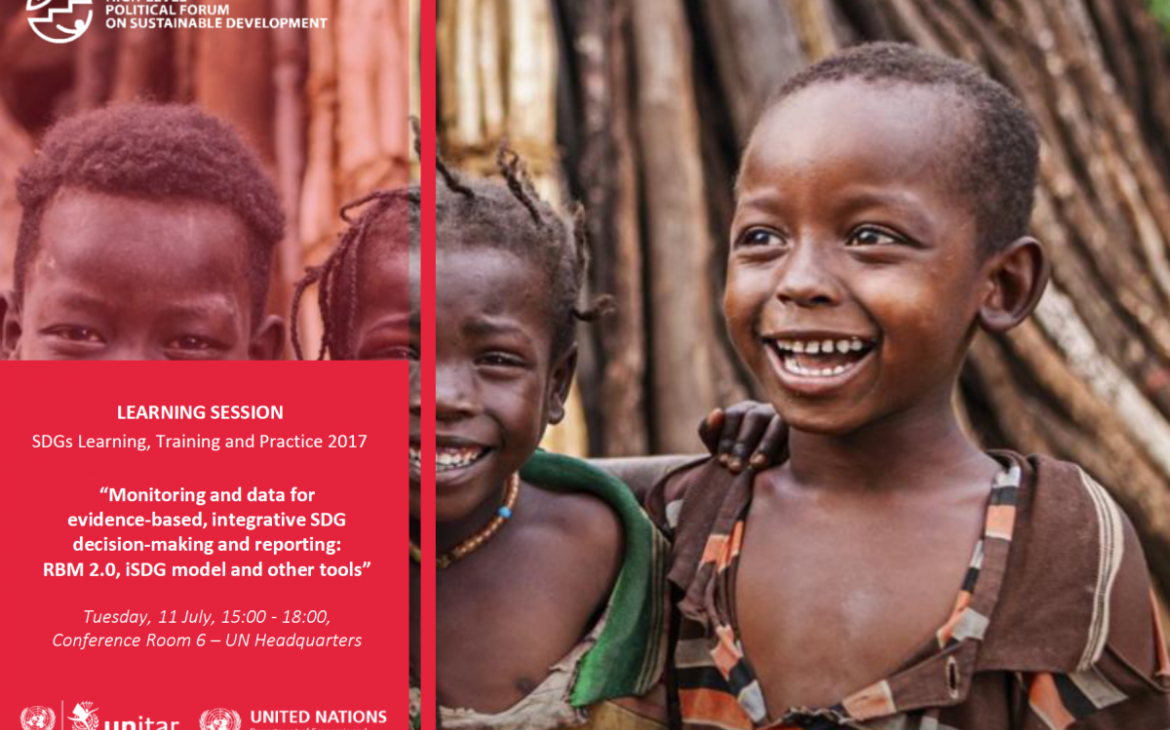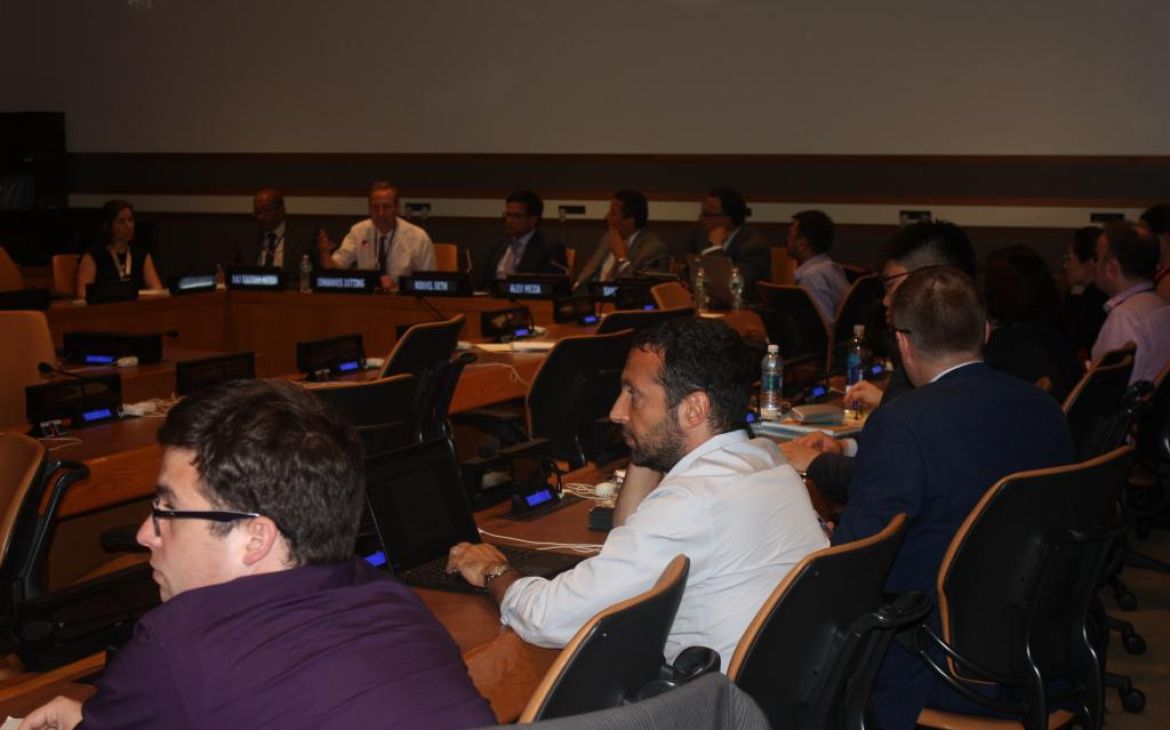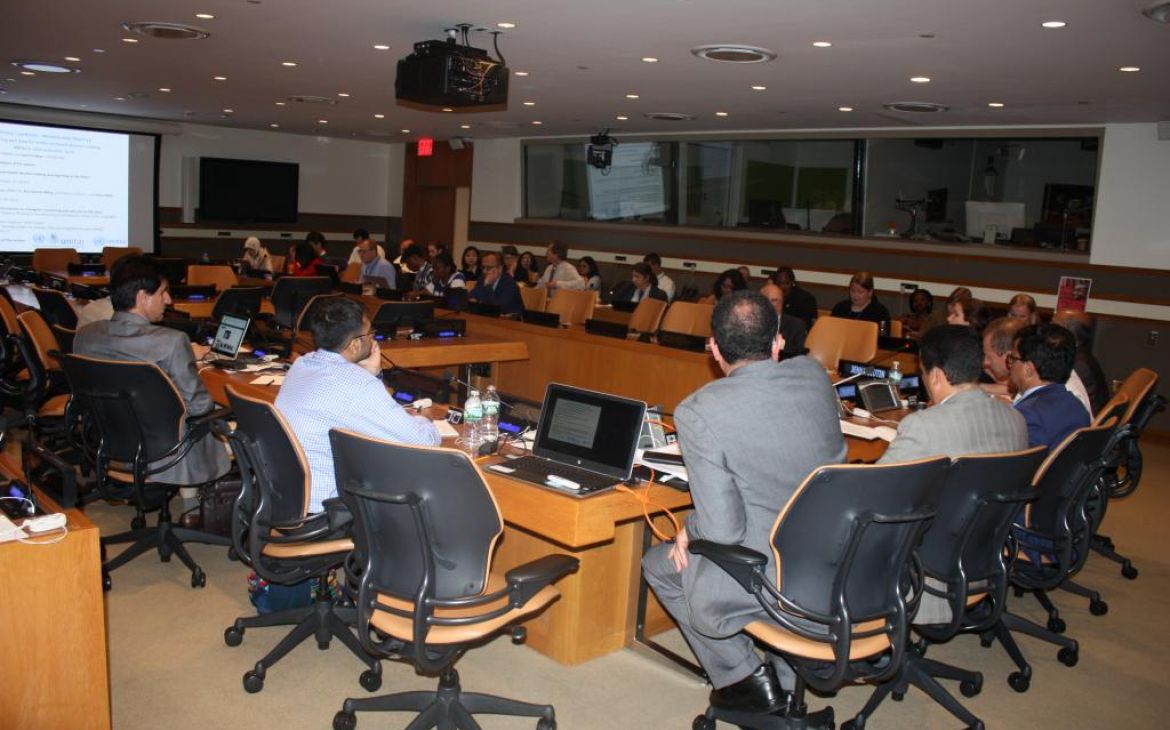11 July, New York, USA - UNITAR and UNDESA held a joint session on learning and data for the SDGs on 11 July on the sidelines of the HLPF, a dedicated annual mechanism for reviewing progress on the SDGs. The session composed of a panel of experts and a showcasing segment provided space for addressing challenges and opportunities related to the use of data for policy-making purposes beyond regular national and global reporting. As a result of the session, a number of capacity gaps had been identified and a series of new tools presented. Feedback received from a group of more than 30 participants will help inform the country-level and regional work of UNITAR and UNDESA in this area.
The 3-hour session kicked of with a panel chaired by UNITAR Executive Director Nikhil Seth and composed of 3 international experts working on data issues for the SDGs: Johannes Jutting from PARIS 21, Raj Gautam Mitra from UN Statistics Division, and Jenna Slotin from the Global Partnership for Sustainable Development Data (GPSDD). Nikhil Seth opened the session highlighting the importance of relevant data collection and data analysis that can help inform the design of “smart”, depoliticized policies aimed at leaving no one behind and enhancing positive interactions between different sectoral areas. He emphasized the critical importance of such evidence for accomplishing a transformational shift in policy design, resource allocation, partnerships and investment decisions.
Following this stimulating introduction, Johannes Jutting offered a thought-provoking vision of the data divide: with a “data tsunami” on the one hand, and the lack of basic data (i.e., birth registries), on the other. Recognizing the need for more granular, nationally produced data for decision making purposes, he pointed to a number of bottlenecks: the persistent funding gap with less than 0.5% of ODA allocated for statistics, often no matching domestic funds, crowding out of national capacities, and a lack of understanding about the possibility to create a focus for overstretched national statistical capacities through SDGs priority-setting (not all the 230 global indicators can be tracked nationally).
In the same vein, Raj Gautam Mitra highlighted the importance of disaggregated data systems to inform improved delivery of basic services. Such data often already exist at community levels and sub-national levels, he said, but statisticians are often not trained for the use of administrative data at the local level. Illustrating his point, Raj Gautam Mitra noted that gross enrolment ratio made no sense at the community level, however, school registers did contain data useful for management purposes, i.e., how many girls dropped out and why.
Moving from technical requirements to the politics of data use and production, Jenna Slotin’s presentation offered several insights into how cross-sectoral community work, partnerships for leveraging various data sources, coordination efforts and work around political issues as major barriers could help improve effective data use for decisions. Right interactions with key players at the right moment can increase chances for certain decisions to be taken, create enabling conditions in terms of legislation and contribute to inter-ministerial coordination, she said. Two examples of GPSDD’s work help illustrate how bringing together different sectors and stakeholders can improve data quality: land use and resilience data in Colombia or birth data in Ghana. The Nairobi meeting recently convened with GPSDD’s support and participation of Kenya, Senegal and Ghana has issued calls for clear commitments to improvements in data in such key areas for the countries as agriculture, economy, birth registrations, health outcomes. It also called for leveraging data science recognizing the great promise of the citizen generated data as volunteer groups work with local communities to fill in official data gaps and map coastal lines, rural, urban areas, and key facilities. It has been recognized however that the new sources of data cannot fully substitute for official data and would need to be integrated with it.
The reflection on the challenges and opportunities was complemented by a discussion of key capacity gaps and development interventions to address them. Johannes Jutting noted in particular that sustainable approach to training and capacity building in this area will require an enabling environment with a clear sense of the role of the NSO and stronger data ecosystem at large supported by relevant governance structures, independent mandate, and political economy conducive to its implementation. Training needs to go beyond technical skills ensuring statisticians better comprehend the user side, and have the right skills related to change management and leadership enabling them to strengthen institutions and relate to non-official data providers. In short, these capacity development interventions need to connect all key dots.
The panel was followed by 3 presentations of tools, incl. the RBM2.0 being designed by UNDESA, iSDG model developed by the Millennium Institute and UNITAR’s training toolkits on reviews and data. Sami Areikat from UNDESA introduced the RBM2.0 showing how the tool piloted in a limited number of the project pilot countries will support monitoring and help ensure no one is left behind and non-linear linkages between various goal areas are reflected across outputs, outcomes and impact. The iSDG model presented by Steven Arquitt from the MI can further support an integrative approach to data collection and monitoring demonstrating the loopholes between investments into various sectors. Finally, Elena Proden from UNITAR provided a snapshot of the planned toolkits to be developed in 2017 as part of the project supported by the Governments of Switzerland and Sweden. These toolkits will be provided as open-source tools to all UN Member States enabling national experts to run national training events. UNITAR will also be organizing a series of regional workshops for LDCs and SIDS using the customized sets and strengthening the capacities of government officials form these countries to produce and use data relevant for SDG decision-making. These training interventions will be evaluated at outputs and outcomes levels demonstrating the contribution of training activities to the strengthening of individual and institutional capacities of relevant Ministries and other Organizations involved in data production and use, as well as SDGs national reports and Voluntary National Reviews (VNRs). UNITAR will also provide on-demand support to a limited number of countries in the use of tools for national purposes.
The Q&A and debate following the panel and the presentations was hosted by Alex Mejia from UNITAR and Sami Areikat from UNDESA.
Presentations
“Disaggregated data for improved delivery of social services” by Raj Mitra, UN Statistics Division
“Capacity building in M&E for the SDGs using RBM approach” by Sami Areikat, UNDESA
“iSDG model” by Steven Arquitt, Millennium Institute
“Training toolkits for reviews, data and integrated decision-making” by Elena Proden, UNITAR
Related links
Contact: a2030@unitar.org
Website: https://www.unitar.org/sustainable-development-goals/accelerating-sdg-implementation




